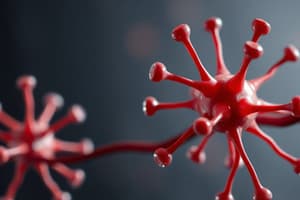Podcast
Questions and Answers
Which of the following is a sympathomimetic drug that increases the 'fight or flight' response?
Which of the following is a sympathomimetic drug that increases the 'fight or flight' response?
- Insulin
- Epinephrine (correct)
- Glucose
- Acetylcholine
Catecholamines, like epinephrine, are rapidly broken down by which enzyme?
Catecholamines, like epinephrine, are rapidly broken down by which enzyme?
- Amylase
- Lactase
- Lipase
- Monoamine oxidase (MAO) (correct)
Which of the following is a noncatecholamine drug that has a longer duration of action?
Which of the following is a noncatecholamine drug that has a longer duration of action?
- Isoproterenol
- Ephedrine (correct)
- Dopamine
- Norepinephrine
What is the primary effect of antiadrenergic drugs?
What is the primary effect of antiadrenergic drugs?
Which of the following drugs acts directly on the body’s receptors to produce its effects?
Which of the following drugs acts directly on the body’s receptors to produce its effects?
Which drug increases the release of natural chemicals in the body instead of directly acting on receptors?
Which drug increases the release of natural chemicals in the body instead of directly acting on receptors?
Ephedrine is an example of a dual-acting sympathomimetic because it:
Ephedrine is an example of a dual-acting sympathomimetic because it:
Why do catecholamines have poor penetration into the CNS?
Why do catecholamines have poor penetration into the CNS?
Sympathomimetics primarily work by stimulating which part of the nervous system?
Sympathomimetics primarily work by stimulating which part of the nervous system?
Which structural component is essential for a drug to be classified as a catecholamine?
Which structural component is essential for a drug to be classified as a catecholamine?
What is a key characteristic of noncatecholamines compared to catecholamines?
What is a key characteristic of noncatecholamines compared to catecholamines?
Which neurotransmitter's effects are blocked by antiadrenergic drugs?
Which neurotransmitter's effects are blocked by antiadrenergic drugs?
Which receptors are directly stimulated by sympathomimetics like epinephrine?
Which receptors are directly stimulated by sympathomimetics like epinephrine?
How does cocaine function as an indirect-acting sympathomimetic?
How does cocaine function as an indirect-acting sympathomimetic?
What describes the mechanism of action for dual-acting sympathomimetics like ephedrine?
What describes the mechanism of action for dual-acting sympathomimetics like ephedrine?
Which process primarily inactivates catecholamines in the body?
Which process primarily inactivates catecholamines in the body?
What determines the polar nature of catecholamines and their ability to cross the blood-brain barrier?
What determines the polar nature of catecholamines and their ability to cross the blood-brain barrier?
Which of the following statements is true regarding antiadrenergic drugs?
Which of the following statements is true regarding antiadrenergic drugs?
Which characteristic is generally attributed to catecholamines?
Which characteristic is generally attributed to catecholamines?
What is a feature of sympathomimetics in general?
What is a feature of sympathomimetics in general?
Flashcards
Sympathomimetics
Sympathomimetics
Mimic the sympathetic nervous system, enhancing "fight or flight" response.
Catecholamines
Catecholamines
Epinephrine, norepinephrine with 3,4-dihydroxybenzene group.
Noncatecholamines
Noncatecholamines
Longer action than catecholamines due to slower breakdown.
Antiadrenergic Drugs
Antiadrenergic Drugs
Signup and view all the flashcards
Direct Acting Sympathomimetics
Direct Acting Sympathomimetics
Signup and view all the flashcards
Indirect Acting Sympathomimetics
Indirect Acting Sympathomimetics
Signup and view all the flashcards
Dual Acting Sympathomimetics
Dual Acting Sympathomimetics
Signup and view all the flashcards
Catecholamine Inactivation
Catecholamine Inactivation
Signup and view all the flashcards
Adrenaline
Adrenaline
Signup and view all the flashcards
Study Notes
Sympathomimetics
- Sympathomimetics mimic the sympathetic nervous system's responses, enhancing the "fight or flight" reaction.
- Epinephrine (adrenaline) is the primary example, increasing heart rate and other sympathetic effects.
- These drugs primarily stimulate the sympathetic nervous system, distinguishing them from other classes.
Catecholamines
- Catecholamines include epinephrine and norepinephrine and share a specific structural component: the 3,4-dihydroxybenzene group.
- They are quickly inactivated by enzymes such as monoamine oxidase (MAO) and catechol-O-methyltransferase (COMT) for maintaining homeostasis.
- Poor penetration of catecholamines into the central nervous system (CNS) is due to their polar nature, hindering the ability to cross the blood-brain barrier.
Noncatecholamines
- Noncatecholamines, like ephedrine, exhibit a longer duration of action compared to catecholamines, as they are not as rapidly broken down by metabolic enzymes.
- They typically have a longer half-life and can be better absorbed orally than catecholamines.
Antiadrenergic Drugs
- Antiadrenergic drugs decrease the "fight or flight" responses governed by the sympathetic nervous system.
- They block the effects of norepinephrine, counteracting sympathetic activation by reducing heart rate and blood pressure.
Direct Acting Sympathomimetics
- Direct-acting sympathomimetics, such as epinephrine, work by binding directly to alpha and beta adrenergic receptors to elicit physiological responses.
- This direct action distinguishes them from other sympathomimetics that may primarily influence the release of neurotransmitters.
Indirect Acting Sympathomimetics
- Indirect acting sympathomimetics, like amphetamines, increase the release of natural neurotransmitters, such as norepinephrine and dopamine, rather than directly binding to receptors.
- Cocaine illustrates this action by blocking the reuptake of norepinephrine in the synapse, resulting in prolonged sympathetic effects.
Dual Acting Sympathomimetics
- Dual-acting sympathomimetics, such as ephedrine, have both direct receptor activation and enhanced release of norepinephrine, combining the effects of both categories.
- This dual action allows for broader therapeutic applications and heightened physiological responses.
Catecholamine Inactivation
- The rapid inactivation of catecholamines occurs through metabolism by MAO and COMT in the body, ensuring transient effects suited for physiological responses.
Studying That Suits You
Use AI to generate personalized quizzes and flashcards to suit your learning preferences.




